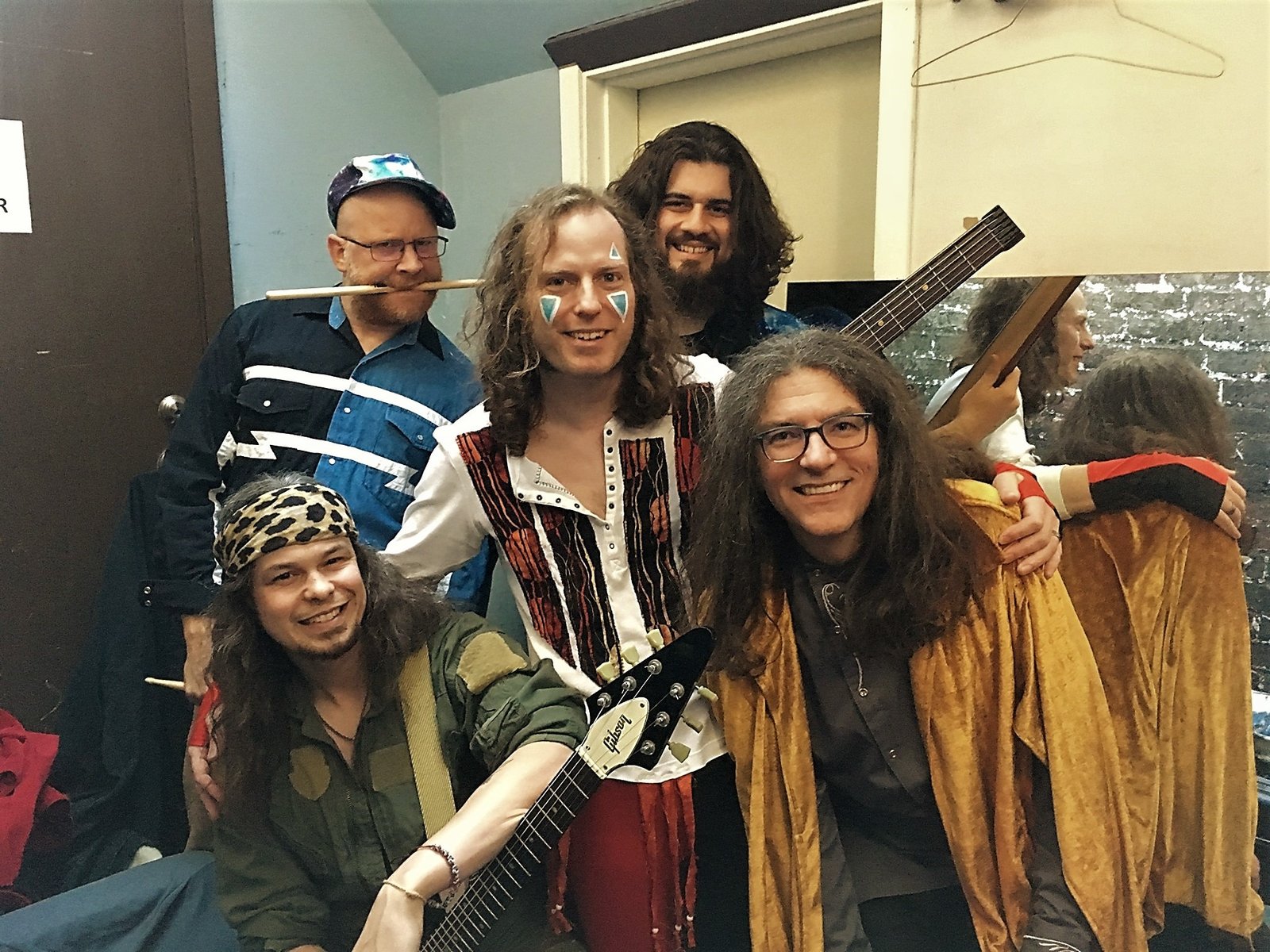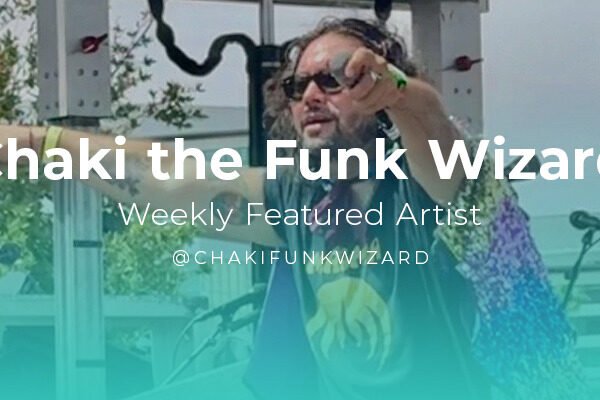Progressive music is… weird. It feels like a limitless endeavor where the only boundaries to it are the ones artists place on the work itself. There’s different flavors of it too – maybe you’re more attuned to the classical stylings of prog rockers like Emerson, Lake and Palmer or YES, or perhaps you came to the game late and were captivated by artists like Devin Townsend or Others by No One. Well, in my eternal search for the best prog in the world, my journey led me to Seattle, Washington – a place where forward-thinking music is basically a primary export of the region – specifically to the cosmic doorstep of emergent band Moon Letters, our latest Weekly Featured Artist.
This is admittedly going to be a hard WFA for me to write because, frankly, even with only one recently released album under their constellational belt, I hold them in high regard. Then again, that’s why were here, right? Everything Is Noise – we showcase great artists that we’re enthralled with. We shine light on bands that are doing something truly special in the endlessly expansive artform of sound and music. It’s with this humble mission and passion that I approached the band in hopes of learning more about them, their work, and what we may be able to look forward to for the future. Michael Trew (lead vocals, flute) and Dave Webb (guitar) were gracious enough to grant me access to the lore of Moon Letters, and it is with their contributions that this article will maintain any semblance of order and keep me from derailing into undiluted prog fanboying. Here’s hoping…
Moon Letters as a name has a historical reference built in, intended by the group themselves or not. Those familiar with the history and structure of the Arabic alphabet surely know what both sun and moon letters are, and while I’m not looking to turn this into a palaeography lecture, there’s allusion there that I can’t help but focus on. This band is heavily informed by the precedent of classic rock and the progressive tendencies that crawled from the primordial ooze of 1960s art with bands like Pink Floyd and The Mothers of Invention. It is this primeval institution that both I and Moon Letters seem to worship – their music’s structure, execution, and demeanor undoubtedly call back to that time, just as the Arabic language still maintains much of its foundational structure today despite many permutations and altered scripts being developed and used the world over. If prog rock were a language or an alphabet, it surely would have a similar etymological history with this Seattle quintet equally paying homage to the past and operating with modern sensibilities.
Since having a history means having an origin, I inquired as to how Moon Letters began. Webb divulges, ‘Moon Letters came into fruition when Michael and I met, despite me putting a call out into the universe asking for a drummer. We realized immediately that there was a lot of mutual respect and admiration for each other’s previous work and that our current interests and intentions aligned.‘ The remaining three members came into the fold seemingly easier than I imagine they would for many other bands. Joining Webb and Trew were Mike Murphy (bass and trumpet in addition to some vocals), John Allday (keyboards, as well as trumpet and vocals), and Kelly Mynes (drums and percussion), all people the two founders had known from previous bands that had played together. Webb quips, ‘I think Mike is the most formally educated of the bunch, but we don’t hold it against him since he’s such a nice guy.‘
With such an intent focus on the music of yore, I had to know what specific influences the band held dear. Given the nature of Moon Letters‘ existence, it’s a question they’re likely used to. ‘The band members all have pretty different influences and it has been a great joy to be be compared to many bands that some or all of us have never even heard of! What a lovely way to find more great music,’ Webb says. ‘Some of us have more punk, metal or DIY backgrounds, and others have done more jazz and orchestral work. Most of us like classic rock and classic prog rock.‘ Trew himself admits, ‘I may have had some subconscious inspiration from Jon Anderson’s ‘76 album Olias of Sunhillow, or even his collaboration with Tangerine Dream from the Legend soundtrack.‘ Webb adds, ‘I think everybody really likes the first song on the YES album, Drama. Maybe we’ll get to cover it someday!‘ “Machine Messiah” is a great song, so I’d personally love to see that cover.
All right, I’ve waited long enough – I must talk about Moon Letters‘ debut album. Called Until They Feel the Sun, it was independently released on June 8 of this year to some hefty acclaim from several sites around the internet as well as British music magazine and scene spearhead PROG. It’s a concept album, as almost all exemplary prog is, focusing on European-North Atlantic (primarily Scottish and Irish) mythos, chiefly selkies or ‘seal folk’, people that were said to be capable of shapeshifting from the form of a seal to human by shedding their sea skin. ‘I’ve been quite taken with the selkie myth since seeing The Secret of Roan Inish as a child,’ illuminated Trew. ‘Within the stories, I was able to find metaphors for aspects of my life and understanding personal growth. To me, a story about self-discovery, pain, and battle seemed to fit the musical content that we were making.‘
I’m sure my numerous references and mentions of old prog rock bands in relation to Moon Letters has more than adequately set up what you can expect to hear from Until They Feel the Sun, but have they really? It’s true – I personally hear some YES and Genesis influence, a dash of King Crimson, and, if I’m being honest, a very subtle hint of modern prog powerhouses like Coheed and Cambria. Still, this album is far, far from being an emulation of any band(s) you could name. The ten tracks here feel so refreshing and new, even with classical production techniques (courtesy of Barrett Jones) that help give them a finely aged tone. What’s more true than anything else: Until They Feel the Sun wields true artistic power in ways that will appeal to nearly any and every rock fan.
The combined efforts of “Skara Brae” and “On the Shoreline” show off an astute incorporation of folk tones, provided tastefully and quaintly by Trew’s flute work which is feather-light and as crisp as the breeze at land’s end. There’s also deft and catchy segments of rock instrumentation with guitars dancing up and down as if mimicking the rush-and-retreat nature of the ocean’s waves caressing a beach’s sands. Maybe you’ll be more receptive to the ethereal and poetic “What Is Your Country” where Trew and company’s vocals stand front and center in an emotive bid to push the story of a selkie found on shore forward. Perhaps you’re more inclined to tap your foot to the snappy melodies set forth in “Beware the Finman” where unease and anxiety build with each repeat of the lyrical refrain ‘get out of here‘ only to be banished by spellbinding keyboards and synths.
The apex of Until They Feel the Sun is undoubtedly “Sea Battle”. It sits neatly in the middle of the album and, at a brush over the nine-minute mark, is the epic setpiece that every outstanding prog album needs. Everyone is at their best here, driving the song forward with various elements that allow each member to shine. It carries the urgency and drama needed to situate itself at the climax of a story such as this, but also offers momentary respite to never let the calmer splendor of Moon Letters‘ overall mood stray too far from reach. You can look forward to time-bending guitar work accented by skittering and harmonic percussion, a theatre-ready vocal performance from Trew that doesn’t betray the realistic fantasy of everything at hand, and – my favorite – keys that shapeshift much like the mythical selkie of focus here. Other album standouts include, but certainly aren’t limited to, the beautifully haunting “Those Dark Eyes” and the strong, subtle album finish found in “Sunset of Man”.
To call Until They Feel the Sun majestic and resplendent would be a gross understatement, but they apply nonetheless. The music contained therein bathes you in a healing salve, piercing your soul with a knowing, comforting gaze. I feel simultaneously at home and stranded on exotic lands when I listen to it, a balance that only the best progressive music and its often cosmic outlandishness can achieve. The only problem that could be levied against it is one that Webb revealed himself: ‘I think our only error was making an album too long to fit on one LP with decent sound quality.’ He offered that if there were any labels looking to help out with this issue, they’re ‘all ears‘ – make it happen, logistic experts!
Of course, for as much I or anyone else can like a creation, the first person, or persons, that should love it should be its creator. Webb shared his thoughts on how the album actually came together:
‘This album was a labor of love and we definitely took our time with the writing. All of us have been in lots of bands so we had a wide breadth of experience to draw from. While Michael and I brought the bulk of the source material in, most of the arranging and evolution of the songs happened as a band. I think the integration of all of our ideas and styles created something unique but complementary. We were really lucky to work with a great producer, Barrett Jones, who was able to ride that line between classic and modern production.‘
It’s no mistake that this album feels special, like a potential watershed moment for underground music, progressive or otherwise. When musicians approach music as an artform and wish for it to relate to its audience, that’s going to make it mean something to people. Webb and the rest of Moon Letters went for just that:
‘I think art is force of love and goodness in the world. If something speaks to a listener or viewer, then something special is happening. I don’t think the artist needs to tell that person what to think or feel. I’m just happy and proud that this album seems to be speaking to people. We really love playing this music together and every show is special to us.‘
Speaking of shows, they’ve seen some success in that regard, creating opportunities to translate their stellar music to a live setting. They’ve had the distinction and honor of playing Seaprog, a regional progressive music festival; a benefit show for Refugee and Immigrant Center for Education and Legal Services (Dave made a point to mention that anyone interested in their work should view their website for more information and to donate – I’m very much inclined to second that statement); as well as other local shows on the regular. Coming up, they look forward to performing at an annual benefit for the Light the Night Walk on September 14 which benefits the Leukemia and Lymphoma Society, and 2020’s Rites of Spring Fest alongside everyone’s favorite progressive locomotive Big Big Train and new-but-old prog rockers Pattern-Seeking Animals. As far as band wishes, Webb states, ‘We’d love to play other festival dates and play in every country in the world. I heard Metallica played on Antarctica recently so maybe we’ll tour there soon?‘ I have it on good authority that penguins love prog rock, so I’m sure they’d love to have you.
I’ve said all I need to say, and then some. I’d naturally love to thank Dave and Michael for taking time out of their busy lives to indulge me and our readers with some insight as to how one makes a shoo-in for album of the year lists. As is often customary for me, I leave the final word for the band:
‘We’d like to really thank everyone who has come to a show or bought our album on Bandcamp, in person, or anywhere. We’d also like to thank all the reviewers and radio hosts who have featured our music. It means a lot to us that people are listening, sharing, and even purchasing our music and it literally enables us to keep going. We hope to play for and connect with people all over the world. There is so much community through music and community creates an opportunity for authentic connection, one of the most healing forces known.‘
Moon Letters is…
John Allday – keyboards, vocals. trumpet
Mike Murphy – bass, vocals, trumpet
Kelly Mynes – drums, percussion
Michael Trew – vocals, flute
Dave Webb – guitars
I invite you to follow the band on Facebook. You can also check out their official site and Bandcamp if you’re interested in hearing the whole album (you should) and/or purchasing it (you really should). If you’re trying to keep the band afloat singlehandedly by generating royalties from listening to Until They Feel the Sun for hours on end, then here’s a Spotify link as well.







